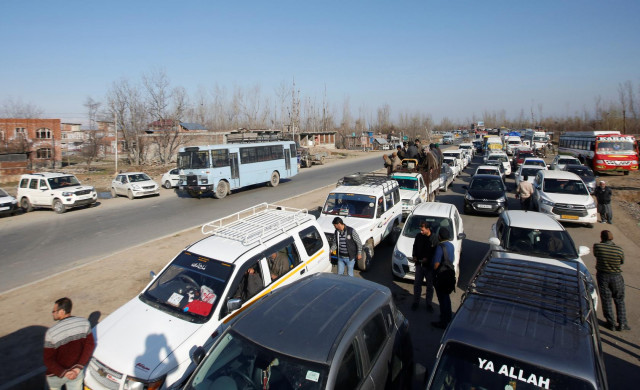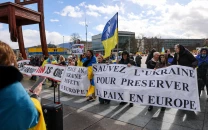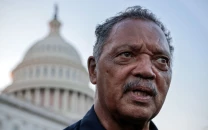School buses, patients held up by Indian roadblocks on main Kashmir highway
Troops have damaged cars during roadblocks in occupied valley, residents allege

Traffic is stopped as the Indian Central Reserve Police Force (CRPF) convoy moves along a national highway in Qazigund March 18, 2019. PHOTO: REUTERS
Tensions in the held territory have been elevated since a suicide car bomb attack killed 40 Indian paramilitary police in the region on February 14.
India has kept up pressure on militant groups on its side of the contested border, boosting its military presence there and arresting hundreds of alleged separatists. Hundreds of thousands of Indian troops patrol the valley, and motorists say security around military convoys has increased delays.
Roadblocks on a 100-kilometre stretch of NH-44, occupied Kashmir’s picturesque main highway linking Srinagar with the rest of India, are sometimes trebling the time it has taken for sick patients to reach hospitals in the capital.
India’s military denies this, saying troops are instructed to stop traffic for only a few minutes at a time, and that ambulances and school buses are getting priority.
“School buses, ambulances will be give priority during the convoy movements,” said Indian defence department spokesperson Colonel Rajesh Kalia on Monday. “We have given directions to the troops on the ground that they are not stopped.”
But the Kashmir Private Schools Association sees no difference in the security forces approach, and its Chairman G N Var said it may have to close down the schools because the disruption is so great.
“The school buses were stopped even today,” Var said. “It is harassment. We can’t run schools like this.”
Irfan Ahmad, 45, a resident of Awantipora in South Kashmir, said it took him three hours to take his mother, Sajja Begum, for treatment at a hospital in Srinagar on March 11, a journey that usually takes an hour.
“She was crying with chest pain but who listened, there were long queues everywhere we were stopped”, he said.
Mohammad Yusuf, an ambulance driver who frequently ferries critical patients from nearby Qazigund to hospitals in Srinagar, said commuting on the highway has become increasingly difficult.
“We are stopped (in) five to six places on the way,” he said. “It takes four hours to take patients from Qazigund to Srinagar and normally it hardly takes 70-80 minutes.”
Waqar Ahmad, a doctor at North Kashmir’s main Baramulla hospital, said he faced similar delays making him late for work shifts.
“Every few kilometres we are stopped by troops on the highway,” he said. “They are very aggressive and they don’t listen to us. We feel insecure. Earlier, they would nicely talk to you and now they are abusive. We are stopped in at least five to six places in a 60-kilometre journey. It is a routine now and we feel dejected.”
The hospital’s medical superintendent, Syed Masood, said most of its doctors were now late for work.
“It affects the functioning of the hospital which caters to lakhs (hundreds of thousands) of people,” he said.
Kashmiri leaders summoned again over fake cases
A rail line intended to link mountainous North Kashmir to the winter capital of Jammu is more than a decade behind schedule.
That means the highway - India’s longest that begins in Srinagar and terminates at the country’s southern tip - is a vital lifeline to Indian-occupied Kashmir.
Some residents also allege that troops have damaged cars during roadblocks.
Khursheed Ahmad, a 23-year-old from South Kashmir, said he was hit by troops carrying batons and had one of his car windows broken at a traffic stop on March 8.
“I was on the way to Srinagar and was stopped by troops, it took me a little while to apply the breaks and two men swooped on me,” he said. “They beat me with batons and smashed one of the window panes.”
Lt General KJS Dhillon, one of India’s top military commanders in the region, denied troops had harassed or assaulted motorists.
“The point about harassment and all, it is not true, it is propaganda,” he said. “I appeal to my civilian friends to please cooperate with the security forces for one and a half minutes.”



















COMMENTS
Comments are moderated and generally will be posted if they are on-topic and not abusive.
For more information, please see our Comments FAQ